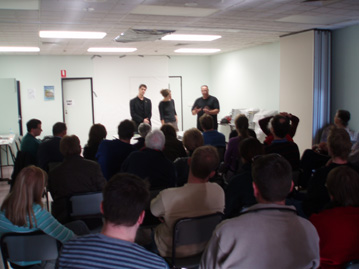Tonight on behalf of the Public Transport Users Association I had the opportunity to address the Laburnum community in regard to the grade separation of Middleborough Road.
While grade separations are a good initiative it is unfortunate that the State Government has released for Middleborough Road that are fatally flawed. Over one hundred attendees flocked to this public meeting to voice their concerns over the lack of consultation and secrecy that has surrounded this project. Considering that the State Government promised to deliver the grade separation of Middleborough Road since 2002 it is abysmal that the government has been unwilling to engage the community over the past four years.
Residents of Laburnum are rightfully concerned about plans that diminish access to Laburnum Station and appear to view the concerns of public transport users and local residents as an afterthought. The current proposal will hamper pedestrian access to Laburnum Station and will fail to take into account cycling access. While residents overwhelmingly supported grade separation initiatives there was next to no support for the current Middleborough Road proposal due to the failure to engage the community and address public transport concerns.
A number of resolutions were passed including:
- That the community supports grade separations but not the current Middleborough Road proposal;
- That there must not be a net reduction in services to Laburnum Station;
- That there must be an improvement to the amenity of Laburnum Station;
- That pedestrian and cycling access to Laburnum Station be improved.
The Laburnum community is right to expect better. The State Government must admit that the process to date has been flawed and must now engage the local community to create a project that meets public expectations. Unfortunately the State Government will continue to deliver poor results until the Bracks Government finally creates an open and accountable transport authority that is charged with meeting the goals of improving public transport usage. After six years of broken promises, cost blow-outs and delayed projects the Bracks Government must surely realise that an overhaul of VicRoads and the Department of Infrastructure is required.
The Laburnum Community must not be expected to embrace flawed designs simply because the Government is unable to provide the expertise and leadership required for such projects.

